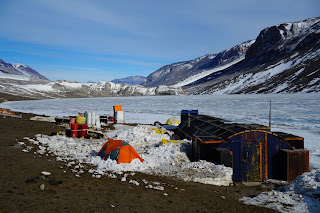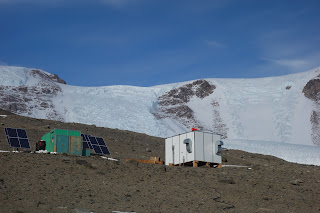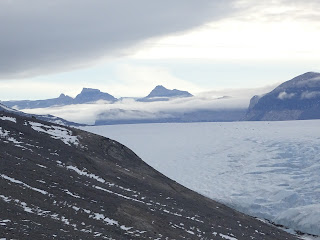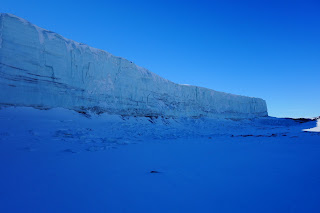10/5/17
One of our tasks as lab managers is to go to the driest
place on Earth, the McMurdo dry valleys. They are across the frozen sound from
Ross Island (the Island we are on). Carolyn and I went out Lake Bonney Camp,
spent the night there, and then went to F6 camp before heading home.
It was of course one of the most amazing experiences! The
helicopter ride from McM to the dry valleys is unreal in its beauty as you fly
over the sound, past icebergs frozen into the ice, then into the mountains and
valleys of the transantarctic range with their huge glaciers and dry valleys
with frozen lakes.
Bonney camp wasn’t opened yet, so when we arrived we turned
on the propane heaters in the lab and set up our tents. We then worked on
prepping the chem and rad labs. We finished our work around 6pm. I had a quick
bite from food I had brought, and then went for a hike. One of the nice things
about the dry valleys compared to McM is that you can hike wherever you please.
Carolyn and I agreed on a 2am return time. If one of us wasn’t back by then,
we’d call MacOps for help. So this gave me a lot of time (though I would have
had more if I could!) to hike. I started out hiking up out of camp and passed
by the foot of a big glacier. Then I
hiked up onto these 2 hills that nearly cut frozen lake bonney into 2. From
there you can look down valley towards lake bonney and another lake and then up
valley towards the rest of lake bonney, some huge peaks, and an incredibly
massive glacier. Where the glacier comes into lake bonney, there is an area of
red ice, named blood falls. The red color is actually caused by red bacteria in
the ice. From there I hiked up to another glacier and then continued up the
valley for quite a while. I eventually saw a peak that I wanted to climb. I
figured being way out here, in a valley that hardly anyone goes to anyways, and
then being many miles away from camp, and this being not the tallest or coolest
peak, it most likely had never been climbed. So I decided to climb it. Of
course I was on a time limit, so I really hustled up the peak. I was sweating a
ton when I reached the summit, which sits at about 5000 feet according to my
watch. I reached the summit a bit after 11pm. I named it Guyser Peak. It had
impressive views all around. Magical views. I knew I had to hustle down to make
it back in time, and I hadn’t realized how steeply up I had gone. It was really
steep, and I had gone a long ways! It was scree the whole way up, but luckily
some of it was fine enough that I could kind of ski down it. And then there
were some snow gullies that I was able to glissade down. I eventually made it
down to lake Bonney. By this time I had some amazing beardcicles growing from
the hot steam of my breath in such cold conditions. Lake Bonney had some really
beautiful blue ice. I walked out on the lake for a bit to get a better look at
blood falls, but the ice, being that the lake never melts completely is really
gnarly and hard to walk on. Little mounts 2 feet high and divots 2 feet down,
so you’d have to walk slowly on it. I still had about 3 or 4 miles to get back
to camp, but not much time left, so I went to the shore and then ran most of
the way back to camp, getting in around 1:45 am. My watch said I had walked
13.5 miles and climbed 6900 vertical feet, which is quite a lot. When I got
back to camp my water bottle was mostly frozen despite being next to my back
and my pee bottle was completely frozen. Antarctica is completely leave no
trace including packing your pee and poo out.
The views in the dry valleys are stunning. The scale is so
huge it’s hard to comprehend. When something looks like it’s just a short
distance away, it can be many, many miles. One of the few ways to tell scale is
when you see a helicopter fly in and you see just how microscopic this big
craft looks compared to the mountains and glaciers. One of the coolest things
about the valleys is that they are so desolate and isolated. If you think about
it, so few people make it to McMurdo. And of the McMurdo-ites so few make it to
the dry valleys. They’re vast and empy, especially this time of year before camp
opening. In this huge valley, it was only Carolyn, 2 carps working on opening
the camps, and myself. Nothing else living! And I was definitely the only one
way up the valley. The vastness and desolation is hard to describe. I imagine
it’s what it feels like to be on another planet. It almost looks like being on
another planet. In fact NASA uses it for robot engineering since it’s the
closest thing on our planet to Mars and some of the moons in our solar system.
When the strong katabatic winds (which create beautiful rock sculptures) aren’t
blowing (as they weren’t on this night), the quiet is also surprising. Our
world is so full of noises from life, people, civilization, running water,
trees in the wind, etc. But when you get out here, the silence is complete. Add
the silence to the desolation and the scale of the landscape, and you can
imagine why this is one of the most amazing places on the planet.
One of the cool things about Antarctica is you can start a
13 mile climb after dinner and never hike in the dark. During my hike the sun
set and then rose again. When I walked back into camp, the early morning glows
were lighting up the mountains across from the lake. I was pretty tired, so I
brushed my teeth, got some melted water, and the crawled into my tent and my
-40F sleeping bag. I slept for a few hours before it was time to get up and
have breakfast. It can be a challenge to sleep in a tent in Antarctica. The
cold doesn’t bother me, but there is constant light.
Carolyn and I did some last lab prep stuff, hung out in the
cool and cozy jamesway structure, walked a bit on lake bonney and then caught a
helicopter to F6 camp which sits on lake fryxell. This is a very small lab, so
it was quick to prep. When we finished, we had time to have lunch on the
deck of the lab and then hike across the
lake to the large commonwealth glacier. On the ride home, the pilot took us on
a detour to the sea-ice edge where we saw a couple large emperor penguin
colonies. We looked for whales, but didn’t see any. On the way back to the
island, you get incredible views of Ross Island and Erebus volcano.
As it was last time, I’m sure the dry valleys will be the
highlight of my year, and I’m so thankful that I got to go. It’s one of those
things that will hopefully imprint in my memory forever.






















































































































































3 comments:
HI TRAV...
While reading your blog about this trip.....I was actually frightened at times when thinking about the possible hazards you might come across - since you mentioned walking all alone on ice that has never thawed out full of pits and humps (and actually thinking maybe you could easily come upon huge crags - and worse yet - deep holes ↕ that could swallow up a human body.)
How's that for scary? Elisha would probably laugh at the above...she knows my imagination pretty well and sudden concerns about what could possibly happen.
Glad you got to have that experience!!! xo
I had some of the same thoughts as Grandma D. as I was reading this blog. The good news is you got back to write about it.
Post a Comment